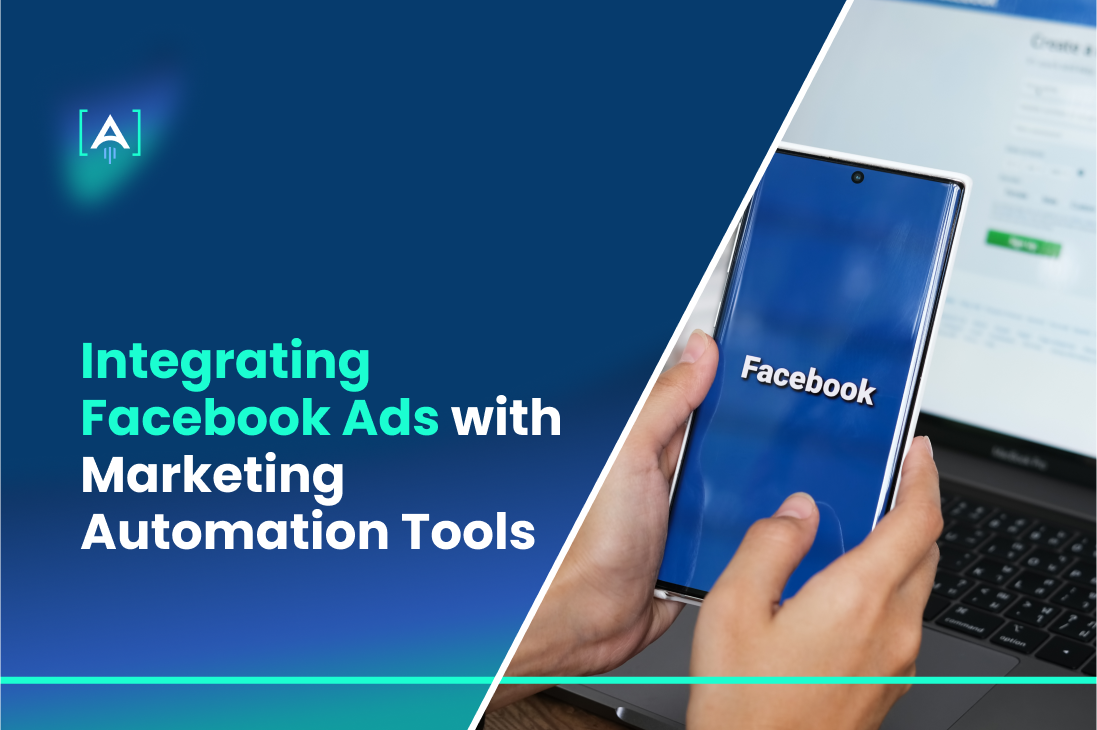Integrating Facebook Ads with marketing automation tools is like giving a skilled archer a high-tech bow.
It makes targeting more precise and efficient.
As businesses strive to reach and resonate with their audiences, integrating these powerful tools offers a path to capturing attention and converting it into meaningful engagement and, ultimately, sales.
Concerning product sales on social media, 25% of marketers believe that Facebook has the highest return on investment.
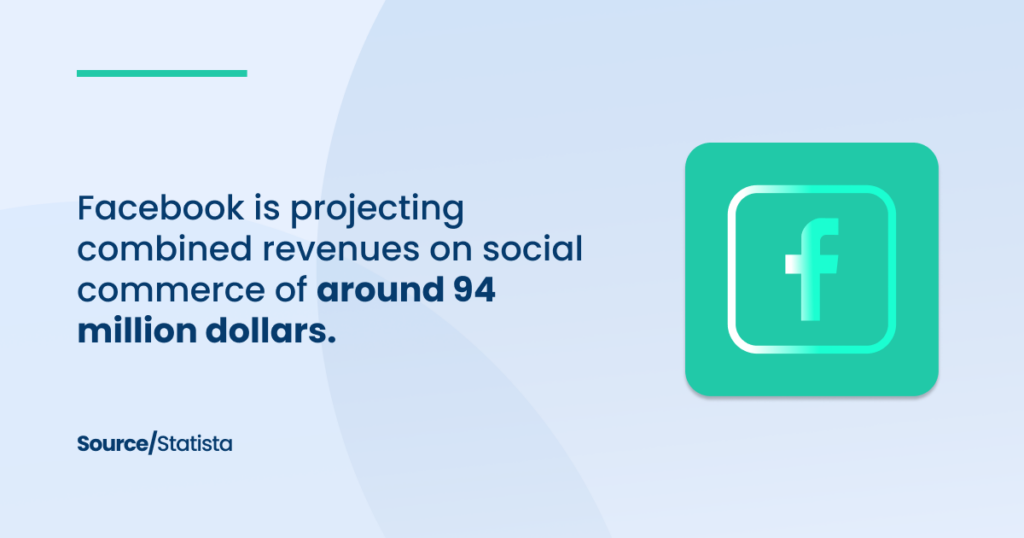
An expert Facebook Ads Agency can elevate your digital marketing strategy by leveraging expert insights and innovative tools to maximize your ad performance on Facebook.
The blog post will cover how to integrate Facebook Ads with Marketing Automation Tools, providing step-by-step instructions on setting up automated workflows.
Understanding Facebook Ads
Facebook Ads have evolved into a sophisticated platform for businesses to reach their target audiences efficiently.
Various Facebook ad tools, including the robust Ads Manager and Meta tools, allow marketers to launch tailored ad campaigns to maximize engagement and conversion rates.
These tools allow for detailed customization and management of ad campaigns and track Facebook ad stats through comprehensive Facebook ads reporting tools.
Advertisers can streamline their campaign processes using Facebook ads automation, from setting up to adjustments based on real-time performance data. This automation capability ensures that campaigns are optimized for the best possible outcomes without constant manual oversight.
Moreover, every ad account is equipped with analytical Facebook ads tools that help marketers understand the impact of their advertisements, aiding in refining strategies and boosting return on investment.
Types of Facebook Ads
Facebook offers a variety of ad formats to cater to different marketing goals and creative styles.
Each type of ad has unique features that make it suitable for certain kinds of messaging and audience engagement.
Image Ads
Image ads are one of the simplest forms of Facebook advertising, but due to their visual nature, they are incredibly effective for driving engagement.
Source: Facebook
Using high-quality, relevant images can grab the attention of Facebook users as they scroll through their News Feeds. These ads are quick to set up and can be created using just a few clicks in Facebook Ads Manager, making them a great starting point for new advertisers.
Moreover, they are less costly to produce yet can yield substantial engagement and conversion rates when executed with compelling imagery and strategic placement.
Video Ads
Facebook video ads are highly engaging and can convey a deeper message that might be too complex for a static image. They can range from short clips to longer-form content, suitable for various advertising goals, from brand awareness to product demonstrations.
Source: Facebook
Facebook’s video ads utilize sophisticated targeting and optimization tools from Meta tools, ensuring that these visually compelling ads reach the audience most likely to watch and engage.
Additionally, Facebook ad stats often show higher engagement rates for video content, making them an invaluable part of most ad campaigns.
Carousel Ads
Carousel ads allow marketers to showcase multiple images or videos within a single ad, each with its own link. This format is ideal for highlighting a product’s different features, telling a step-by-step story, or explaining a process in stages.
Carousel ads leverage Facebook ads automation to automatically rotate the creatives, providing audiences with a richer understanding of the advertised product or service. They are especially popular in e-commerce ad campaigns, where businesses highlight a range of products to attract clicks and conversions.
Slideshow Ads
Slideshow ads are a cost-effective alternative to video ads. They allow advertisers to create a video-like experience using a series of still images. This is particularly useful for ad accounts with limited budgets or for audiences in areas with slower internet connections.
Slideshow ads on Facebook use less data and load quickly, ensuring a smooth user experience while delivering dynamic ad content. They can be created directly within the Facebook Ads Manager, using existing images or stock photos available through Meta tools.
Key Performance Indicators (KPIs) for Facebook Ads
Understanding the effectiveness of your Facebook ad campaigns hinges on analyzing key performance indicators (KPIs) that measure success against your objectives.
Using Facebook ads tools and reporting features, advertisers can gain insights into how well their campaigns perform, aiding in optimizing their strategies for better results. Whether focusing on broad reach or specific actions, the KPIs you track can greatly influence your overall Meta ad strategy, especially when employing Facebook ad automation to streamline your efforts.
Click-through Rate (CTR)
Click-through rate (CTR) is a critical metric in Facebook marketing. It indicates the percentage of viewers who have clicked on your ad.
Source: Search advertising clickthrough rate (CTR) worldwide from 1st quarter 2018 to 1st quarter 2024, Statistics
A high CTR means your ad is relevant and engaging to your target audience, a positive signal to the Facebook ads algorithm. This metric is essential for evaluating the immediate response of your ad sets and is particularly significant in Facebook Ads B2B environments where the decision-making process is information-driven.
By employing sophisticated Facebook ad tools, marketers can refine their ad sets to better resonate with their intended audience, thus improving the CTR. Regular analysis using Facebook ads reporting tools allows marketers to tweak their images, copy, or call-to-action buttons to enhance engagement.
Moreover, leveraging Facebook ad automation can help you efficiently A/B test different elements of your ads, further optimizing your ad performance.
Conversion Rate
Conversion rate is another crucial metric, particularly when assessing the efficacy of Meta ads in prompting users to take a desired action, such as making a purchase or filling out a contact form. This KPI helps advertisers understand how well their Facebook ad campaigns convert interest into action, which is paramount in measuring ROI.
Source: WordStream
Improving conversion rates involves examining user behavior and preferences, requiring sophisticated segmentation and targeting using Facebook ads tools.
For B2B marketers, where conversions may involve longer sales cycles and multiple touchpoints, optimizing ad campaigns for higher conversion rates can include setting up nurturing sequences using Facebook ad automation.
These sequences can help maintain engagement, gradually guide prospects toward conversion, and gather data to refine future ad sets.
Cost per Acquisition (CPA)
Cost per Acquisition (CPA) measures the cost of acquiring a customer through your Facebook ad campaigns. It is an essential metric for budgeting and financial planning, helping marketers assess the economic efficiency of their ad spend.
A lower CPA is generally preferable, as it indicates a higher ROI, making it a critical focus in any Meta-ad strategy․
Source: WordStream
Advertisers can use Facebook ad tools to manage and reduce CPA to refine their targeting options. This ensures ads are seen by users most likely to convert at the lowest possible cost. Employing Facebook ads reporting tools allows for continual monitoring and adjusting campaigns to reduce costs.
Moreover, Facebook ad automation can dynamically allocate budgets to the most effective ad sets, maximizing campaign returns.
What is Marketing Automation?
Marketing automation refers to software and technologies designed to help marketers effectively market on multiple online channels (such as email, social media, websites, etc.) and automate repetitive tasks.
This technology aims to streamline marketing workflows and measure the outcomes of marketing campaigns, making these processes more efficient.
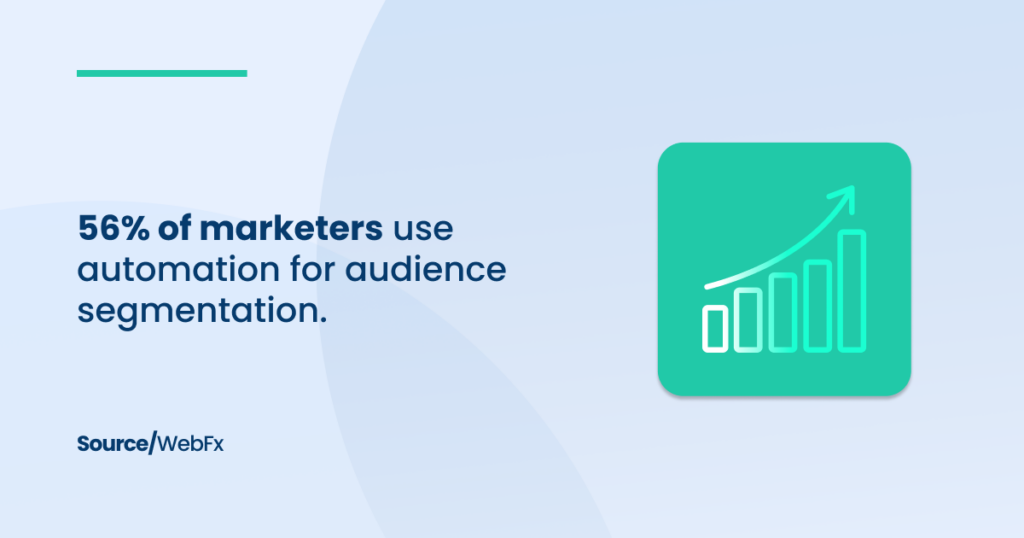
When integrated with social media marketing, particularly through platforms like Facebook, marketing automation can enhance how marketers create ads, manage ad settings, and streamline ad management. It supports various aspects of Facebook ad campaigns, from uploading ads to editing and adjusting ad settings on a Facebook page.
This holistic approach saves time and allows for more precise targeting and better campaign performance.
Core Features of Marketing Automation Tools
Marketing automation tools come with various features designed to simplify the complex processes involved in modern marketing campaigns. These Facebook ads tools enhance the effectiveness of campaigns across all stages, from planning and creation to execution and analysis.
Email Automation
Email automation is a fundamental feature of marketing automation tools. It allows marketers to send time- or action-triggered emails with relevant information to subscribers.
Integration with Facebook ads tools enhances this feature by enabling the creation and promotion of targeted email campaigns that reflect users’ interactions with ads on a Facebook page.
Source: HubSpot
This feature is critical in maintaining engagement with potential customers by ensuring they receive appropriate communication at optimal times without manual input every time. For instance, when a new user interacts with an ad on Facebook, marketing automation can trigger a welcome email sequence, increasing conversion chances through consistent follow-up.
Lead Nurturing
Lead nurturing is another essential feature that refers to developing relationships with buyers at every stage of the sales funnel. This involves understanding the nuances of customer behavior and providing them with the information they need to make informed purchasing decisions.
Source: Blogging Wizard
Marketers can fine-tune their strategies using Facebook ads reporting tools alongside lead nurturing features based on detailed analytics about how users interact with ads.
For example, suppose potential customers engaged with a specific ad campaign but did not convert. In that case, marketing automation tools can help develop a nurturing path specifically for these users, providing them with personalized content that can guide them back to the sales funnel.
Analytics and Reporting
Analytics and reporting are crucial features that provide insights into the effectiveness of marketing campaigns. They collect data from various sources, including social media marketing efforts like Facebook ads, to give a comprehensive performance overview.
Marketing automation tools often include dashboards and reporting features that integrate with Facebook ads tools to track metrics such as reach, impressions, clicks, and conversions. This integration helps marketers understand which ad settings and content types are performing best, allowing for real-time editing and uploading of ads to optimize campaigns.
Additionally, these tools can segment data based on demographics, engagement levels, and more, providing detailed reports that help marketers make informed decisions. This analytical capability ensures that every ad created and every dollar spent is done so with strategy and precision, ultimately boosting the ROI of digital marketing efforts.
Benefits of Marketing Automation
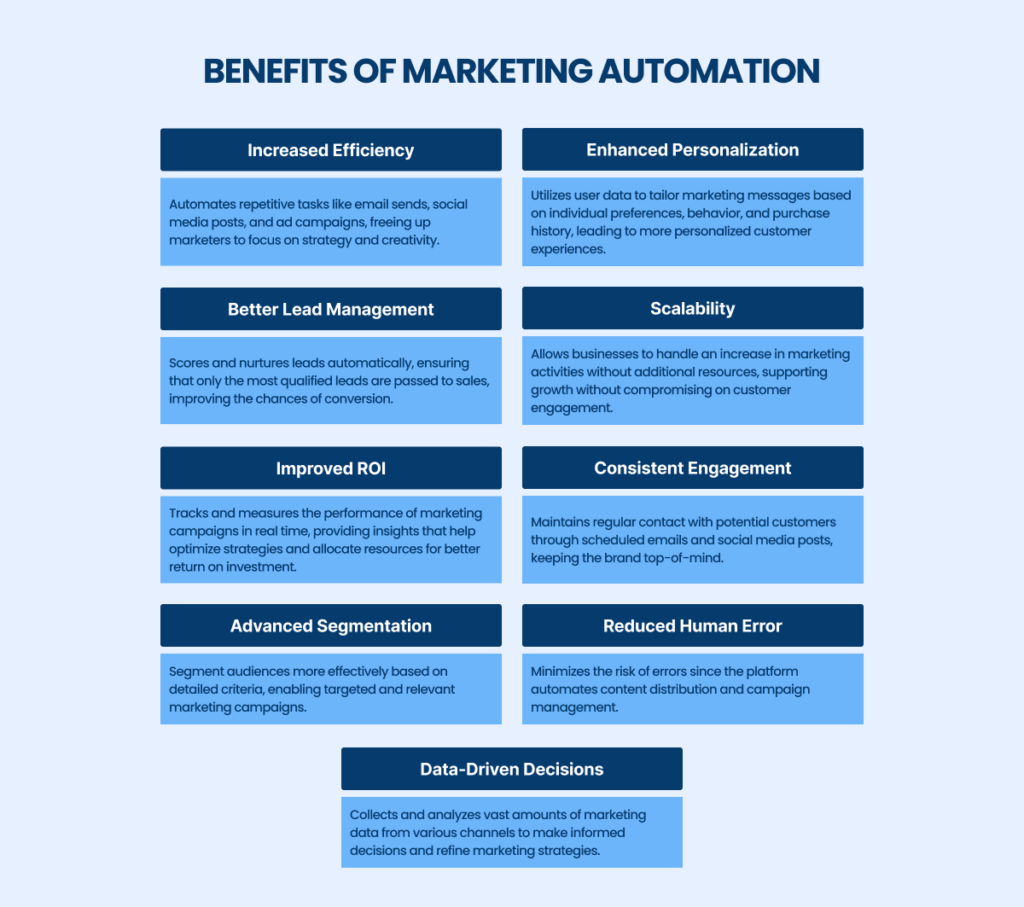
Integrating Facebook Ads with Marketing Automation Tools
Integrating Facebook Ads with marketing automation tools provides a streamlined approach to managing ad campaigns that can enhance targeting, conversion rates, and spending efficiency.
This integration leverages the strength of both platforms—Facebook’s vast user base, detailed targeting capabilities, and the systematic, data-driven processes of marketing automation.
By using Facebook ads tools in conjunction with marketing automation, businesses can automate repetitive tasks, refine targeting strategies, and improve overall ad performance.
The synergy between Facebook’s sophisticated ad creation and editing tools and marketing automation’s ability to manage and analyze these ads can transform how businesses engage with their audience. It also simplifies managing campaign elements, such as ad sets, adjustments, and performance metrics, through advanced Facebook ads reporting tools.
This integration saves time and ensures that every aspect of an ad campaign is optimized for the best possible outcomes.
Reasons for Integration
Enhanced Targeting
One of the most compelling reasons for integrating Facebook Ads with marketing automation tools is its enhanced targeting.
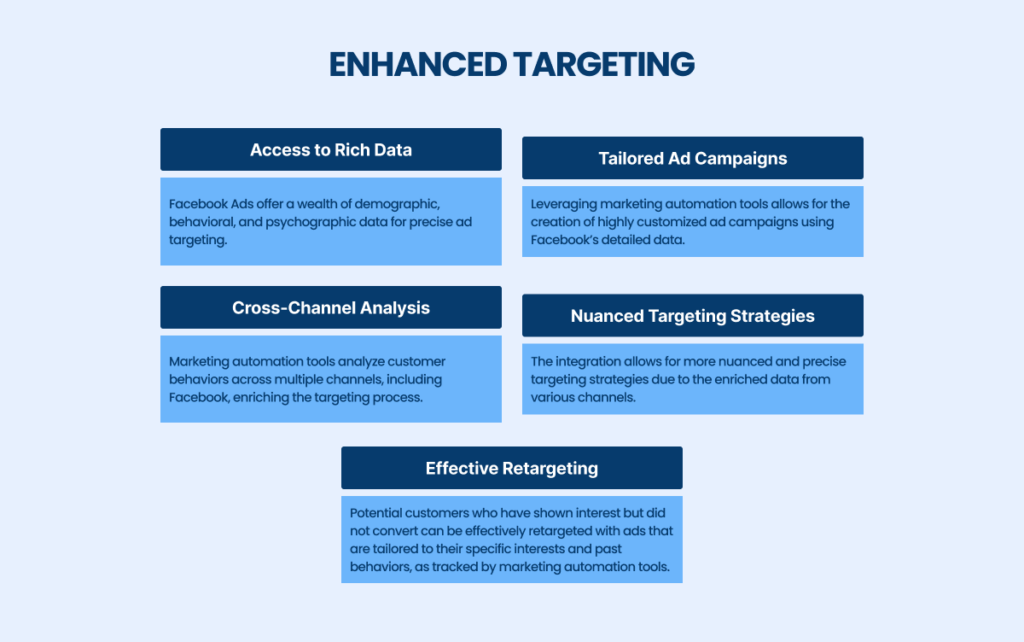
Improved Conversion Rates
Integrating Facebook ads with marketing automation tools also leads to improved conversion rates.
- Effective Lead Nurturing: Integrating Facebook ads with marketing automation tools enhances lead nurturing throughout the buying journey.
- Tracking Interactions: Marketing automation can track each user’s interactions with ads, providing valuable data for targeted follow-ups.
- Automated Follow-ups: The system automatically sends users follow-up emails or relevant content based on their interactions with Facebook ads.
- Trigger-Based Workflows: When a user engages with a Facebook ad, the marketing automation tool triggers a workflow designed to convert interest into a sale, such as sending a customized email with more information or a special offer.
- Continuous Engagement: Continuous, automated engagement helps keep the business in mind for consumers, significantly boosting conversion chances.
- Enhanced Conversion Opportunities: Strategically using automated workflows and personalized content directly increases the likelihood of converting ad interactions into actual sales.
Efficient Spending
Another significant benefit of integrating Facebook ads with marketing automation tools is spending efficiency. Marketing automation provides detailed insights into the performance of ad campaigns through sophisticated reporting tools. This enables businesses to see which ads are performing well and which aren’t, allowing for real-time adjustments to the campaign.
Efficient spending is achieved by dynamically reallocating the budget to high-performing ads and pausing or modifying those underperforming ones. This adaptive spending strategy ensures that the ad budget is used optimally, maximizing ROI.
Additionally, automation tools can schedule ads for the most effective times, reducing waste and leveraging moments when the audience is most receptive.
Partner with [A] Growth Agency to Integrate Facebook Ads
Integrating Facebook Ads with marketing automation tools offers a transformative approach to digital marketing.
Businesses can enhance their ad targeting, improve conversion rates, and spend their marketing budgets more efficiently.
[A] Growth Agency will contribute to the synergy, enabling a more personalized, data-driven marketing strategy that reaches and resonates with the target audience and drives meaningful engagement and conversions.
Remember that Excellence is our standard, and we cultivate a team of ‘A players’ – top-tier talents who bring passion and expertise to every challenge.
If you want to learn more about our experience and offers, move forward!
